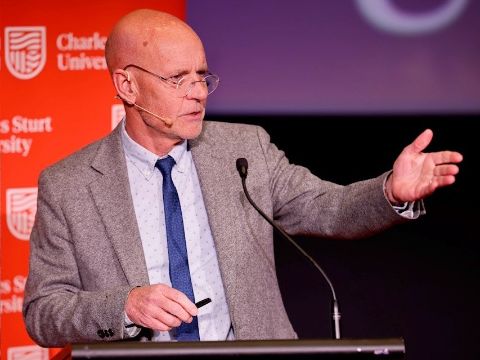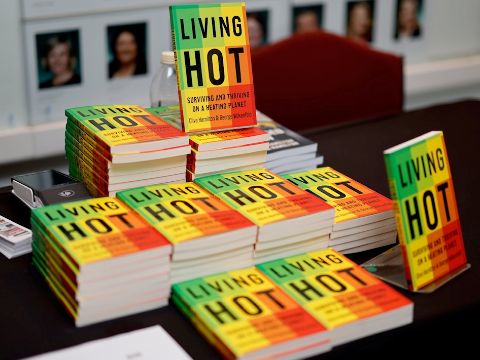- After many years teaching and researching climate change, Charles Sturt University has launched a new research program to be led by Professor Clive Hamilton
- The Living Hot Project represents a turning point in the development of the debate over climate change in Australia
- Failing to begin preparation now will cause unnecessary suffering for all but particularly for those least able to protect themselves from the impacts of a changing climate
Charles Sturt University has announced a new research program to help ‘shift the dial’ on the nation’s approach to the climate change predicament, and progress beyond reducing emissions to preparing for life in a new and less amenable climate.
 This coincides with the launch of a new book, Living Hot – Surviving and Thriving on a Heating Planet, by Charles Sturt University Vice-Chancellor’s Chair of Public Ethics Professor Clive Hamilton (pictured left) and highly respected energy expert Dr George Wilkenfeld.
This coincides with the launch of a new book, Living Hot – Surviving and Thriving on a Heating Planet, by Charles Sturt University Vice-Chancellor’s Chair of Public Ethics Professor Clive Hamilton (pictured left) and highly respected energy expert Dr George Wilkenfeld.
Speaking at the launch at the Parliament of Australia in Canberra on Wednesday 5 June Charles Sturt Vice-Chancellor Professor Renée Leon said the Living Hot Project aims to help understand how to build community resilience on a warming planet.
“The new Living Hot Project represents a turning point in the development of the debate over climate change in Australia,” Professor Leon said.
“It is predicated on the fact that, if Australians are to cope with the dangers ahead, then we must shift our attention to a sustained program of investment in protecting the country and our way of life from the ravages of floods, bushfires, droughts, storms, cyclones and heatwaves.
“We hope that the Living Hot Project will help ‘shift the dial’ on the nation’s approach to the climate predicament and push us all into the next phase, beyond reducing emissions towards preparing for life in a new and less amenable climate.”
Professor Hamilton said, “I hope that our research program will spark deeper public and political engagement with the threat of climate change and how we can prepare for it.
“Building on previous research, we plan to focus much more public and political attention on the kind of Earth we are moving into and what we can start doing to survive and even to live well.
“If we leave today’s children to look after themselves on a hotter Earth, we will be piling one moral failure onto another.”
 Professor Leon (pictured left) noted that the Inter-governmental Panel on Climate Change (IPCC) has warned that dangerous warming of the Earth is inevitable, bringing more extreme weather events along with social and economic disruptions.
Professor Leon (pictured left) noted that the Inter-governmental Panel on Climate Change (IPCC) has warned that dangerous warming of the Earth is inevitable, bringing more extreme weather events along with social and economic disruptions.
“While we must do our fair share in cutting emissions, it is already apparent that climate change will affect our lives in Australia for generations to come,” she said.
“It is clear that building a resilient nation means changing how we think about the future and transforming how we live and work.”
Professor Leon said Charles Sturt’s leading role in agricultural research positions the University well to support the transitions that will need to be made to support Australia’s food security for the decades ahead.
“Global heating presents particular challenges for First Nations peoples, especially those living in regional and remote areas, and the Living Hot Project will explore the implications of the changing climate for caring for Country,” she said.
Professor Leon said the project will take a particular interest in building resilience by local communities and local councils and its research will shape the national conversation, not least around the effects of global warming on the most vulnerable in our communities.
“Although Australia is lagging in making preparations for the changing climate, there are pockets of forward-looking activity that hold lessons for the broader community,” she said.
“The University’s research program will study prototypes of adaptation activity by communities, local councils, utilities and businesses in Australia, examples that might serve as models for others.”
 The Canberra launch of the book Living Hot and the Living Hot Project was hosted by Charles Sturt Deputy Vice-Chancellor (Research) Professor Mark Evans.
The Canberra launch of the book Living Hot and the Living Hot Project was hosted by Charles Sturt Deputy Vice-Chancellor (Research) Professor Mark Evans.
The launch included a discussion by an esteemed panel chaired by Professor Stan Grant Jnr and featured Charles Sturt’s Professor Clive Hamilton, Independent Senator David Pocock, Greens Senator Nick McKim, Mrs Bridget Archer, MP, and renowned journalist Michelle Grattan, AO.
Living Hot – Surviving and Thriving on a Heating Planet is published by Hardie Grant.






Social
Explore the world of social